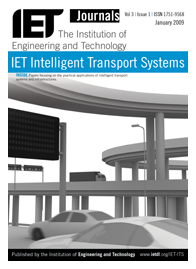Call for Abstracts
Abstract submission is now closed
News for DDI2018 is that abstracts have to be 2-3 pages (1000-1500 words) in length and that it is possible to choose to give an oral presentation only, develop the extended abstract into a paper for either the IET Journal or DDI proceedings, or contribute with a poster. All extended abstracts and papers for DDI proceedings are peer‐reviewed by the Scientific Committee.
The conference Scientific Committee welcomes extended abstracts for presentations, papers or posters from all stakeholder groups (researchers, designers, engineers, policy makers, transport companies, etc.), from all modes of transport (land, air and sea) and from any relevant discipline including, but not limited to, psychology, neuropsychology, neuroscience, human factors, medicine, ergonomics, sociology, epidemiology, engineering and technology, law and politics, etc. We look forward to receiving extended abstracts from a good mix of academics and practitioners.
IET Journal
We are pleased to announce that we also this year have a collaboration with IET Journal. Authors can choose to contribute with a full paper for a Special Issue of the IET Intelligent Transport Systems journal.
IET Intelligent Transport Systems is an interdisciplinary journal devoted to research into the practical applications of intelligent transport systems and infrastructures.
Type of contribution
Authors of extended abstracts indicate when they submit whether they:
- Give an oral presentation only
- Give an oral presentation and write a paper to IET if Scientific committee agrees
- Give an oral presentation and write a paper to DDI proceedings if Scientific committee agrees
- Contribute with a poster only
- Contribute with a poster and write a paper to IET Journal, if Scientific Committee agrees
- Contribute with a poster and write a paper to DDI proceedings, if Scientific Committee agrees
Suggested topics
Theory
- Definition of distraction and inattention
- Distraction and inattention due to new forms of mobility
- Mechanisms of distraction and inattention
- Assessment of distraction and inattention
- Models of distraction and inattention
- Various forms of distraction (advertising, wearable devices, etc.)
- Distraction in the context of automation
- Factors that give rise to inattention and distraction
- Distraction as an addiction
Impact
- Effects on driving performance
- Effects on driver behaviour and information processing
- Effects on crashes and near‐misses occurrences
- Impact on crash risk
- Factors mediating impact (eg age, experience, gender)
- Measurement of distraction and inattention
- Measurement of public perceptions about distraction and inattention
Countermeasures
- Legislation and enforcement
- Company and transport policies
- Road, vehicle and technology design
- Real‐time distraction prevention and mitigation systems
- Promotion/Advertising
- Education and training and driver licensing
Review process
– Phase 1: Extended abstract
- All extended abstracts submitted will be peer-reviewed by the Scientific committee.
- Accepted abstracts will, depending on the choice by the author, be invited to be developed into a paper either for the IET Journal or DDI proceedings. It is also possible to give an oral only presentation, or contribute with a poster only.
– Phase 2: Full paper
- All papers submitted for DDI proceedings, will be peer-reviewed by the Scientific committee.
- Submission of full papers to the IET Journal will be right after the conference, and handled in a separate process.
- Papers that are not accepted by the reviewers as peer‐reviewed papers will not appear in the proceedings, but the authors may be invited to deliver an oral presentation.
Abstract submission guidelines >>
If you have any questions regarding abstracts please contact: ddi2018@meetx.se


